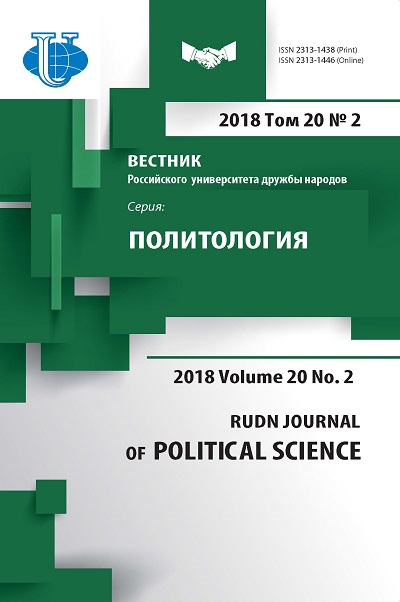EUROPEAN VECTOR OF THE POLICY OF RUSSIAN ORTHODOX CHURCH: THE FEATURES OF THE FORMATION IN THE POST-SOVIET PERIOD
- Authors: Lunkin R.N.1
-
Affiliations:
- Institute of Europe Russian Academy of Sciences
- Issue: Vol 20, No 2 (2018)
- Pages: 278-287
- Section: VALUE CONTENT OF RUSSIA’S FOREIGN POLICY
- URL: https://journals.rudn.ru/political-science/article/view/19071
- DOI: https://doi.org/10.22363/2313-1438-2018-20-2-278-287
Cite item
Full Text
Abstract
With the raising of the security dangers in Europe and the challenges of the migration the problem of the saving of the Christian identity of the continent was recognized as more actual and sharp. As well as the problem of the discrimination of Christians in the Middle East. Russian Orthodoxy suggested its own response on the global challenges. The Author analyzed the role of the Russian Orthodox Church (ROC) and the effectiveness of the using of the potential of the ROC in the foreign policy of Russia. In the article was used the methods of the historical and sociological analysis of the public declarations and actions of the representatives of the ROC and the state officials. The author pointed that the Russian Church step by step in its foreign policy proceeded from the nationalistic ant western rhetoric to the European vector of its policy where the significant role began to play the super national interests of the Russian Church and the rights and freedoms of the religious associations in a secular society.
About the authors
Roman Nikolayevich Lunkin
Institute of Europe Russian Academy of Sciences
Author for correspondence.
Email: romanlunkin@gmail.com
the researcher of the Institute of Europe Russian Academy of Sciences, the head of the Center for Religious Studies
11/3 Mokhovaya str., Moscow, Russia, 125009References
- Doklad Svyatejshego Patriarha Kirilla na XH Vsemirnom russkom narodnom sobore. 1 noyabrya 2016. Available from: http://www.sedmitza.ru/patriarch/2016-11-01/6718351.html. (In Russ.).
- Sovmestnoe zayavlenie Papy Rimskogo Franciska i Svyatejshego Patriarha Kirilla. 13 fevralya 2016 g. Patriarhiya.Ru. Available from: http://www.patriarchia.ru/db/text/4372074.html. Data obrashcheniya: 05.04.2018. (In Russ.).
- Sostoyalas' vstrecha Svyatejshego Patriarha Kirilla s chlenami Komiteta predstavitelej Pravoslavnyh Cerkvej pri Evropejskom Soyuze. Mospat.RU. 08.10.2017. Available from: https://mospat.ru/ru/2017/10/08/news151113/. (In Russ.).
- Papa o vstreche s Patriarhom Kirillom. Radio Vatikana. Available from: http://ru.radiovaticana.va/ news/2016/02/19/. (In Russ.).
- Upolnomochennyj MID RF obespokoen zakonodatel'nymi iniciativami na Ukraine, svyazannymi s zahvatom hramov. Interfaks religiya. 21.09.2016. Available from: http://www.interfaxreligion.ru/?act=news&div=64532. (In Russ.).
- Vystuplenie mitropolita Smolenskogo i Kaliningradskogo Kirilla na VI Vsemirnom Russkom Narodnom Sobore. ZHurnal Moskovskoj patriarhii. 2002; 1. (In Russ.).
- Kazaryan N. Vsepravoslavnyj sobor: formirovanie novoj pravoslavnoj geopolitiki. Gosudarstvo, religiya, Cerkov' v Rossii i za rubezhom. 2016; Vol. 34; 1. (In Russ.).
- Krasikov A.A. Vselenskoe i Russkoe pravoslavie v poiskah identichnosti. Analiticheskaya zapiska № 29, (№ 59). 2016. Available from: http://instituteofeurope.ru/images/uploads/ analitika/an59.pdf. (In Russ.).
- Krasikov A.A. Ikona i topor. Religioznye missii na obshchestvennoj arene: rossijskij i zarubezhnyj opyt. Moscow: IE RAN; 2016: 5—25. (In Russ.).
- Lunkin R.N. Cerkvi i politika v rossijsko-ukrainskom krizise 2014—2015 godov. Religioznye missii na obshchestvennoj arene: rossijskij i zarubezhnyj opyt. Moscow: IE RAN; 2016. (In Russ.).
- Mitrofanova A.V. Mezhdunarodnye slavyanskie dvizheniya i interesy Rossii. Vestnik RGGU. Seriya: Politologiya. Istoriya. Mezhdunarodnye otnosheniya. Zarubezhnoe regionovedenie. Vostokovedenie. 2010; 4 (47): 226—233. (In Russ.).
- Cerpickaya O.L. Missii i predstavitel'stva v sisteme zarubezhnyh uchrezhdenij RPC. Obozrevatel'-Observer. 2011; 4: 42—48. (In Russ.).
- Yakovlev A.I. Religioznyj faktor v mirovoj politike v ehpohu globalizacii: ot sekulyarizacii k fundamentalizmu. Vestnik Moskovskogo universiteta. Seriya 25: Mezhdunarodnye otnosheniya i mirovaya politika. 2013; 4: 4—38. (In Russ.).
- Boomgaarden H., Freire A. Religion and Euroscepticism: Direct, Indirect or No Effects? West European Politics. 2009; Vol. 32; 6: 1240—1265.
- Milardović-Ivanković A. Euroscepticism in a Conflict of Ideologies of the Second Modernism. Euroscepticism and European Integration. Contributor(s): Krisztina Arató (Editor), Petr Kaniok (Editor). Centar za politološka istraživanja. Zagreb; 2009: 52—53.
- Minkenberg M. Religion and Euroscepticism: Cleavages, Religious Parties and Churches in EU Member States. West European Politics. 2009; Vol. 32; 6: 1190—1211.
- Mudrov S. Christian Churches in European Integration. Routledge Studies in Religion and Politics; 2016: 192.
- Mudrov S. Christian Churches as Special Participants of European Integration: The Process of EU Treaties’ Reform. European Consortium for Political Research. Available from: https://ecpr.eu/Events/PaperDetails.aspx?PaperID=10583&EventID=1.
- No EU Exit for Us, Say Italy's on-the-rise Eurosceptics. The Guardian. 18.07.2016. Available from: https://www.theguardian.com/world/2016/jul/19/no-eu-exit-for-us-say-italys-on-the-riseeurosceptics.
- Spiritual and Cultural Dimension of Europe. Concluding Remarks. Reflection Group Initiated by the President of the European Commission and Coordinated by the Institute for Human Sciences. Vienna / Brussels, October 2004.
- Steven M. Christianity and Party Politics: Keeping the Faith. Routledge Studies in Religion and Politics; 2011. 169 p.
















